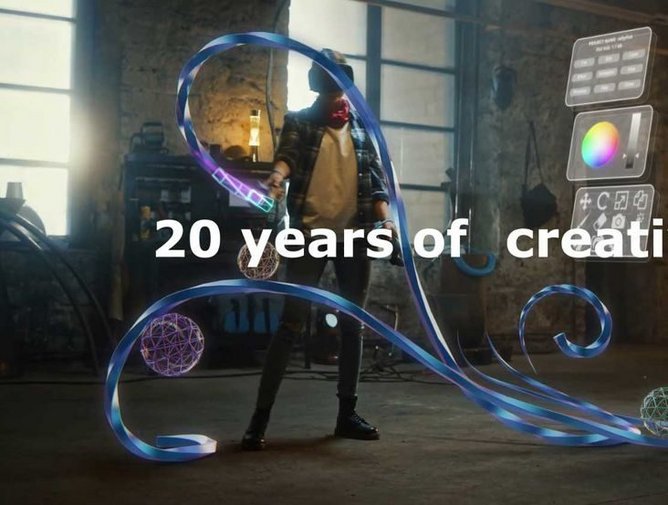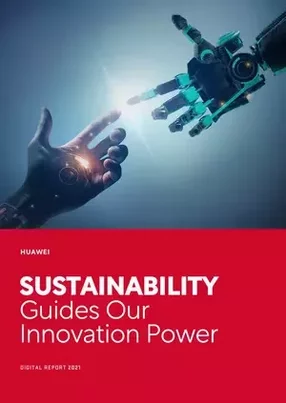The race to digital, accelerated by Covid-19, has not only shown the transformational capabilities of technology but also how much society as a whole depends upon connectivity. Economies across the globe have been decimated by the pandemic and, as physical borders have been closed and supply chains disrupted, it has become increasingly clear that digitalization is potentially the silver lining to Covid’s dark cloud – and a route to recovery. That can only happen when companies and countries collaborate, as they have done for decades.
Take Huawei in Sweden, for instance. For more than 20 years, the company has contributed to the rapid digitalization of Swedish society, as a trusted local technology partner that delivers solutions to all the fixed and wireless networks in Sweden. Huawei has been integral to the 3G and 4G networks, as well as installing wifi in schools across the country.
Karin Thurberg, Director Product Management, has 20 years of experience from leading positions in the telecommunications industry, and has been working at Huawei Sweden since 2011. She manages the market-leading Radio Access Network portfolio for the European market.
She says collaboration and close relationships are part of the DNA of the telecom industry.
“Collaboration is one of the core values that has shaped the success of the global telecom industry, together with unified standards,” says Thurberg. “These two cornerstones have brought interoperability across vendors and shared security standards, which creates a larger market and therefore lower consumer prices. I think the importance of cooperation, both up and down the value chain, will increase with 5G and beyond.”
“No one will have the resources and the innovation power for doing this advanced research on their own. I think it would be a giant step backwards in development if the industry was not going to manage this. It would be against the industry’s DNA.”
Thurberg is speaking as grave legal uncertainties hover above Sweden’s 5G rollout. In October 2020, PTS announced license conditions in the upcoming 5G auction that ban Huawei (and ZTE) due to security risks, and gave the telecom operators participating in the 5G auctions until 1 January 2025 to remove Huawei equipment from the existing infrastructure.
The very basic question is whether the license conditions that prohibit Huawei's equipment and services in the Swedish 5G network are unlawful or not. This is subject to review in the Administrative Court in Stockholm. The trial is likely to end in April 2021.
In addition, the European Commission has sent a letter reminding Sweden that it has not fulfilled the obligation to notify in advance the changes to the Swedish Electronics and Communications law. The amendment to the domestic law may therefore be invalid. Consequently the security evaluation made by the security police and armed forces should not have been carried out.
The ban was blasted even by Huawei’s biggest rival, Ericsson, with CEO Börje Ekholm reportedly threatening to remove Ericsson from its native Sweden if Huawei was not part of the 5G rollout. Excluding Huawei from the 5G network and wider infrastructure would have a negative impact on the global industry and wider society.
This sentiment is also supported by Erik Hallberg, the respected Swedish telecoms expert who is currently acting as an active board member and investor in different companies – private as well listed. He previously spent 17 years in executive positions with Telia around the globe and has been chairman of the board for mobile operators in Estonia, Latvia and Lithuania.
Hallberg believes that Sweden is in danger of falling behind other countries when it comes to innovation if it does not have the very best, latest technology available via 5G and beyond.
“The problem is that for Sweden, from Sweden’s perspective, if we are not on top, we will lose the innovation climate that we had in the past,” says Hallberg. “For me as a Swede, it's even more critical because that's where we have our future. We are a small country, 10 million people out of 10 billion. So in reality, we must be on top to prosper.”
Hallberg goes on to say he believes Sweden is lagging behind European neighbors including Germany and the UK and that losing digital leadership which would be a blow for the country.
“I think that's scary for Sweden,” he says. “This delay in 5G, the roadblocks put in place, is not only making life hard for Huawei. It is delaying the innovation climate in Sweden. You can go to Finland where they already have five-year licenses. This is such a fast-moving enough industry that once you fall behind, it's difficult to catch up.”
The importance of innovation cannot be underestimated. What 5G brings is far more than faster mobile browsing and streaming video content that is being used to entice consumers.
The essential research that Huawei is doing right now in Sweden will be instrumental to 5G and the evolved 5.5G that is the next step towards 6G. Remove Huawei’s contribution to the Swedish wireless networks and the global innovation cycle becomes disrupted.
Huawei’s Thurberg also has concerns for the future of innovation, and fears Sweden could miss out on 5.5G and 6G. “Much of what goes into the global networks is actually a result of Swedish research activities. In 2019 alone we invested 1.1 billion SEK into our local research”, she says
“Sweden has a long history of both manufacturing and automotive industry, and we have come a long way in digitizing our society.
“At the same time, Sweden is an early adopter market where you get quick feedback on new concepts targeting both consumers and enterprise users. The research on future wireless networks that we conduct in Sweden fits very well into that equation.”
“With 5.5G we will take social interaction to a next level by further reducing the gap between the physical and digital worlds. 5.5G is at the same time a response to the accelerating industry automation that will bring a more diverse set of IoT uses that will rely on sensing capabilities and heavy uplink transmission”
“Continuing, the 6G network will deliver such high bandwidth and low latency that we will be able to digitally transfer ourselves as holograms,” says Thurberg. “And they will appear as truly realistic versions of ourselves. I think this will significantly reduce the need for physical travel over time, which will have positive environmental impact. AI will be an instrumental part of the 6G network architecture and will also be an enabler for energy reduction”
Champions of sustainability
Huawei has always used innovation to address sustainability, and that is an ever-greater focus with 5G and 6G networks. Thurberg strongly believes that climate change has to be tackled for the sake of the planet, and also to tear down social barriers.
The United Nations set out its Sustainable Development Goals (SGDs) in 2015. They are a call-for-action by all countries to promote prosperity while protecting the planet. They recognise that ending poverty must go hand-in-hand with strategies that build economic growth and address a range of social needs while tackling climate change and environmental protection. The SDGs are intended to be achieved by the year 2030 – by which time the telecom industry i aims to be delivering 6G.
“5G and to a greater extent 6G will help us reduce the energy consumption in the mobile network significantly,” says Thurberg. “It will enable the build-up of smart cities, and perhaps even more important support a wide range of industries to achieve their environmental targets.
“It is also an enabler for essential rights such as healthcare and education. The ultimate consequence of these sustainability development goals is that we have to generate more connectivity for more people from less energy. We therefore put a lot of effort into making our equipment more energy efficient and on solutions that can deliver coverage over large areas. And that could be either in developing countries or it can be across Sweden’s sparsely populated areas.”
When it comes to the UN goals, they are a clear challenge, but one that Thurberg says have to be met.
“It’s not a question of if. We simply have to make it. No single company owns the responsibility alone – these goals should be on all companies’ agendas, and should therefore stimulate collaborations across the industry and within the ecosystem,” she says.
“I actually believe that companies that do not meet these strict goals will not survive commercially. They will not be accepted by society. The other side of this coin is that the sustainability goals themselves will also generate business for companies like Huawei. They will guide us where to focus our innovation power. They will push us to develop new breakthrough technologies.
“That's how we can differentiate ourselves with other vendors. The sustainability goals are an opportunity for us”




